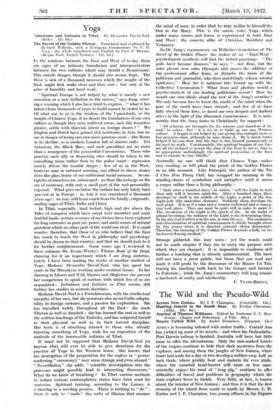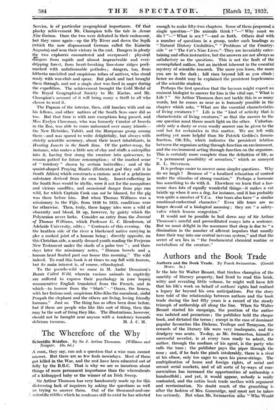The Wild and the Pseudo-Wild
Journal of Thomas Williams. Edited by Professor G. C. Hen- derson. (Angus and Robertson. 2 Vols. 42s.) Beasts Called Wild. By AncirO Demaison. (Grayson. 15s.)
AFRICA is becoming infested with motor traffic ; Central Asia has yielded up most of its secrets ; and when the Oodnadatta- Port Darwin railway is finished, Australia will have but little more to offer the adventurous. Only the rain-soaked forests of the tropics continue to hide their dark mysteries from the explorer, and among these the jungles of New Guinea, where boots laid aside for a day or two develop a mildew crop half an inch thick, where prickly beat and malaria for ever abide, where the cannibal head-hunte.s still more or less unre- strictedly enjoys his meal of " long pig,". continue to offer difficulties of travel and problems in geography which the born explorer loves to tackle. Very little, in fact, is known about the interior of New Guinea ; and thus it is that the first crossing of the island from south to north ..by. Messrs. C. H. Karius and I. F. Champion, two. oung officers in. the Papuan Service, is of particular geographical importance. Of that plucky achievement Mr. Champion tells the tale in Across 21Tha-Guinea. Once the two were defeated in their endeavour, but they came again—up the Fly River and down the Sepik (which the now dispossessed German called the Kaiserin Augusta) and 'won their victory in the end. Dangers in plenty the two eiploreis encountered and 'overpassed : physical (angers from rapids and almost impenetrable and ever:- dripping forest, from heart-breaking limestone ridges pock- marked, with unfathomable potholes.; dangers, too, from hitherto. unvisited and suspicious tribes of natives, who stood ready with war-club and spear. But pluck and tact brought them through, and not a single shot was fired in anger during the expedition. The achievement brought the Gold Medal of the Royal Geographical Sciciety to Mr. Karius, and Mr. Champion's account of it will bring many a thrill to all who choose to read it.
The Papuan of the interior, then, still lunches with and on his fellows, and other natives of the South Seas once did so too. But that time is with rare exceptions long passed, and Miss Evelyn Cheesman, who was formerly Curator of Insects in the Zbo, was able to roam unharmed over many islands7- the New Hebrides, Tahiti, and the Marquesas group among them—and was spared to -write delightfully, but always with :strictly scientific accuracy, about their insect inhabitants, in Hunting Insects in the South Seas. Of the potter-wasp, far instance, who makes a little urn of clay and stuffs a caterpillar into it, having first stung the creature into quiescence, to remain potted for future consumption ; of the marked sense of " territory " shown by certain butterflies ; and of the quaint-shaped Praying Mantis (Hottentot god they call it in South Africa) which constructs a curious nest of a gelatinous substance derived from its own body. Insect-collecting in the South Seas would be idyllic, were it not for the mosquitoes and vicious sandilies, and occasional danger from pigs run wild, for -which Captain Cook can sot be blamed, for the pig was there before him. But when Thomas Williams was a missionary in the Yips, from 1840 to 1853, conditions were ' far otherwise. Then, truly, these happy isles were a wild of • obscenity and blood, lit- up, however, by gaiety which the Polynesian never lacks. Consider an entry from the Journal • of Thomas Williams, which Professor G. C. Henderson, of Adelaide University, edits : " Contrasts of this evening. On the heathen side of the river a blackened native carrying in glee a cooked joint of a human being ; directly opposite, on this Christian side, a neatly dresied youth reading the Feejeean New Testament under the shade of a palm tree " ; and three days later the missionary notes, " Human bowels and : a human head floated past our house this morning." The wild indeed. To read this book is at times to sup full with horrors, but its main interest is, of course, ethnological.
To the pseudo-wild we conic in M. Andre Demaison's Beasts Called Wild, wherein various animals in captivity am suffered to express their psychology in one hopes) remunerative English translated from the French, and in which—to borrow from the " blurb "—" Ouara, the lioness, with her furious soul, suspicious Kho-Kho the marabout, sinful Poupah the elephant and the others are living, loving friendly humans." Just so. The thing has so often been done before, but if there are people who like this sort of thing, then this may be the sort of thing they like. The illustrations, however, should not be brought near anyone with a tendency towards



















































 Previous page
Previous page